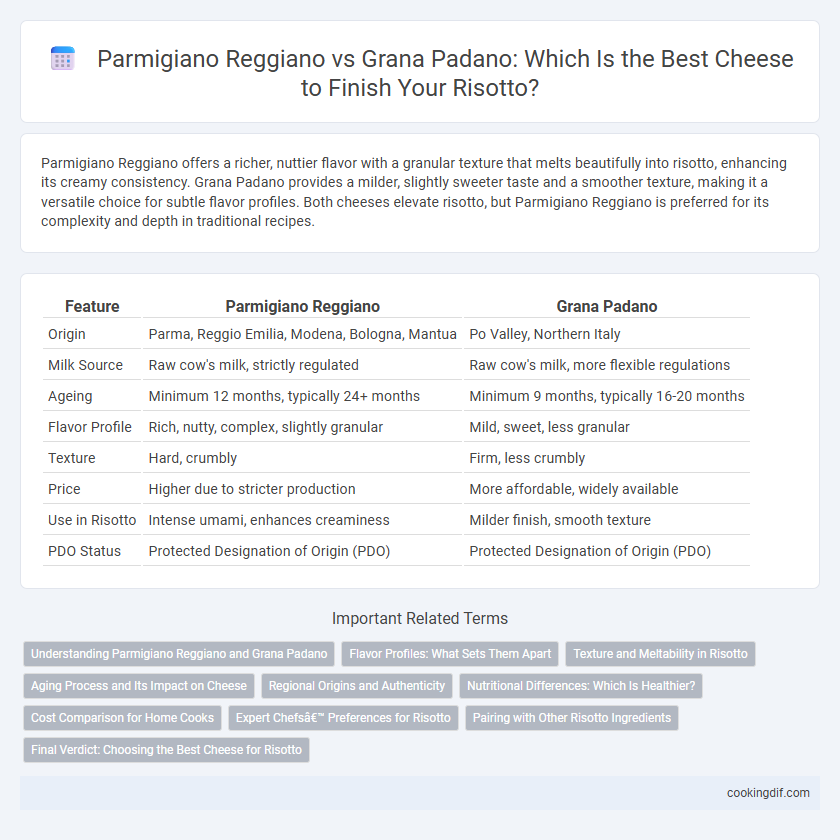Parmigiano Reggiano offers a richer, nuttier flavor with a granular texture that melts beautifully into risotto, enhancing its creamy consistency. Grana Padano provides a milder, slightly sweeter taste and a smoother texture, making it a versatile choice for subtle flavor profiles. Both cheeses elevate risotto, but Parmigiano Reggiano is preferred for its complexity and depth in traditional recipes.
Table of Comparison
| Feature | Parmigiano Reggiano | Grana Padano |
|---|---|---|
| Origin | Parma, Reggio Emilia, Modena, Bologna, Mantua | Po Valley, Northern Italy |
| Milk Source | Raw cow's milk, strictly regulated | Raw cow's milk, more flexible regulations |
| Ageing | Minimum 12 months, typically 24+ months | Minimum 9 months, typically 16-20 months |
| Flavor Profile | Rich, nutty, complex, slightly granular | Mild, sweet, less granular |
| Texture | Hard, crumbly | Firm, less crumbly |
| Price | Higher due to stricter production | More affordable, widely available |
| Use in Risotto | Intense umami, enhances creaminess | Milder finish, smooth texture |
| PDO Status | Protected Designation of Origin (PDO) | Protected Designation of Origin (PDO) |
Understanding Parmigiano Reggiano and Grana Padano
Parmigiano Reggiano and Grana Padano are both Italian hard cheeses with distinct production methods and aging requirements, impacting their flavor profiles in risotto. Parmigiano Reggiano, aged for 12 to 36 months, offers a complex, nutty, and slightly granular texture ideal for enhancing risotto's creaminess. Grana Padano, aged at least 9 months, provides a milder, buttery taste with a smoother consistency, making it a versatile choice for a subtler cheese finish.
Flavor Profiles: What Sets Them Apart
Parmigiano Reggiano delivers a rich, nutty flavor with a sharp, tangy finish that enhances risotto's creaminess. Grana Padano offers a milder, slightly sweeter taste with less granular texture, providing a smoother cheese melt. The distinct aging processes--Parmigiano Reggiano aged 12-36 months and Grana Padano aged 9-24 months--significantly influence their flavor intensities and textures in the final dish.
Texture and Meltability in Risotto
Parmigiano Reggiano delivers a granular texture and intense umami flavor that melts smoothly into risotto, enhancing creaminess without becoming overly stringy. Grana Padano offers a softer, slightly less granular texture with excellent meltability, contributing a milder, buttery finish ideal for a delicate, cohesive risotto consistency. Both cheeses improve risotto's richness, but Parmigiano Reggiano provides a more robust taste and texture contrast, while Grana Padano ensures a smoother, subtler melt.
Aging Process and Its Impact on Cheese
Parmigiano Reggiano undergoes a minimum aging process of 12 months, often extending to 24-36 months, resulting in a complex flavor profile with granular texture ideal for risotto. Grana Padano ages between 9 to 24 months, producing a milder and creamier cheese with less crystalline crunch compared to Parmigiano Reggiano. The longer aging of Parmigiano Reggiano intensifies umami notes and enhances cheese granularity, elevating the richness and mouthfeel of risotto dishes.
Regional Origins and Authenticity
Parmigiano Reggiano, originating from the provinces of Parma, Reggio Emilia, Modena, and parts of Mantua and Bologna, is renowned for its strict production standards and Protected Designation of Origin (PDO) status, ensuring authentic regional quality. Grana Padano, produced across a broader area of the Po River Valley, also holds PDO recognition but offers a milder flavor profile due to different aging processes and regional milk sources. Choosing Parmigiano Reggiano for risotto enriches the dish with a complex, nutty intensity deeply rooted in Emilia-Romagna's artisanal heritage, while Grana Padano provides a subtler, creamier finish reflecting its wider geographical authenticity.
Nutritional Differences: Which Is Healthier?
Parmigiano Reggiano contains higher protein content and essential minerals like calcium and phosphorus compared to Grana Padano, supporting bone health and muscle function. Grana Padano has a lower fat content and slightly fewer calories, making it a lighter choice for those monitoring fat intake. Both cheeses provide beneficial probiotics from aged fermentation, but Parmigiano Reggiano's longer aging process may enhance digestibility and nutrient absorption.
Cost Comparison for Home Cooks
Parmigiano Reggiano typically commands a higher price point than Grana Padano, largely due to its longer aging process and protected designation of origin status. Grana Padano offers a more budget-friendly alternative for home cooks, while still providing a similar savory flavor profile to enhance risotto dishes. Choosing Grana Padano can deliver cost savings without compromising the creamy, umami-rich finish essential for authentic risotto.
Expert Chefs’ Preferences for Risotto
Expert chefs frequently prefer Parmigiano Reggiano over Grana Padano for finishing risotto due to its complex, nutty flavor and granular texture that enhances creaminess. Parmigiano Reggiano's aging process, typically 24 to 36 months, develops robust umami notes ideal for elevating risotto's taste profile. While Grana Padano offers a milder, less sharp flavor, it is often chosen for a subtler finish when a lighter cheese balance is desired.
Pairing with Other Risotto Ingredients
Parmigiano Reggiano enhances risotto with its rich, nutty flavor and granular texture, complementing earthy ingredients like mushrooms, truffles, and saffron. Grana Padano offers a milder, creamier profile that blends seamlessly with lighter risotto components such as asparagus, peas, and seafood, creating a balanced, delicate finish. Choosing Parmigiano Reggiano or Grana Padano can elevate the overall harmony between cheese and risotto ingredients for an authentic Italian culinary experience.
Final Verdict: Choosing the Best Cheese for Risotto
Parmigiano Reggiano offers a richer, nuttier flavor and a granulated texture that melts smoothly into risotto, creating a creamy consistency that elevates the dish. Grana Padano provides a milder taste with a slightly softer texture, making it a suitable option for a more delicate flavor profile. For the best risotto experience, Parmigiano Reggiano is the preferred choice due to its intense flavor and superior melting properties, enhancing the dish's richness and depth.
Parmigiano Reggiano vs Grana Padano for Final Cheese Infographic

 cookingdif.com
cookingdif.com